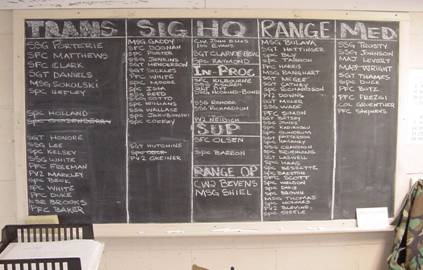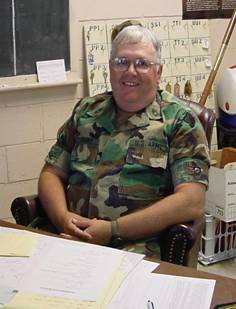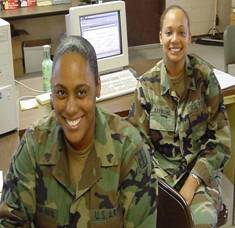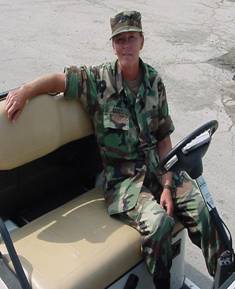 Keeping It All in Order: The daily staffing board in First Sergeant Alvin Evans' office. On any given day, there could be as many as 140 reservists carrying out National Matches duties. |
| Behind
the Scenes with the Army Reserve
For shooters who come to the National Matches at Camp Perry, Ohio there is a great deal going on that they may never see. Organizing and carrying out the various tasks that are needed to make the matches as enjoyable as possible for the shooters is a daunting task. Thankfully, the CMP and the NRA have some help. The USAR 88th Regional Support Command and 88th Regional Support Group provide specialized support for the matches in order to help them matches run smoothly as well as to comply with federal law. The support these units provide is invaluable for the success of the National Matches. Alvin Evans is a City Councilman from a small town in Kentucky during the year. Come summer, he spends his time as the First Sergeant for the regional support command at the National Matches. "We handle all the transportation, all the signal, all the medical, in-processing...all the military support." This, in fact, is something Evans has been doing for 15 years now. “We have a hand in about everything that goes on to prepare for the Matches and provide support services during the Matches," Evans stated. Retired Lieutenant Colonel John R. Ellis is the man in charge, and has been a part of the National Matches for 16 years--13 years as a reserve officer, and the past three as a civilian hire. His regular occupation as a high school guidance counselor gives him summers off--and the opportunity to serve. Ellis sees a lot of the same people every year. "We'll take a golf cart and sit out on Viale Range at night. You can sit down there for three or four hours and just have people come up and talk to you.” What Ellis and others set up is a "provisional headquarters," which "is set up specifically to provide support for the National Matches." All equipment used is either contracted or loaned to the operation and "goes back to wherever it came from during the winter months." Both Ellis and Evans get to the camp by mid-June. They don't leave until well after the National Matches are over in August. All the Reserves who come to Camp Perry are volunteers. They come from all over the country. And like the Texas tag team of Crystal Clarvoe-Bevil and Margaret Raymond, who are truck drivers for their Reserve unit, they come from all walks of life. Sergeant Sue Gaddy is from Cincinnati, and is on the range "all the time." During the year, she prepares tax returns. Yet, during the Matches, Gaddy is responsible for setting up and maintaining all the communications equipment used on the firing ranges. Gaddy is out on the range by 5:30 am, and doesn't leave until the range closes, which is usually no later than 7:00 pm. Her biggest problem with the job? "The weather," she says. But when asked she likes most about working at Camp Perry, her answer is also, “the weather.” Staff Sergeant James Trusty serves as the senior range medic--one of a handful of reservists at the National Matches from start to finish. He oversees trained medical reservists both on the line and in the pits. Although in nine years at Camp Perry, he has seen things from scrapes to heart attacks, Trusty watches mostly for heat related problems. Part of the problem is the heat. But Trusty knows from experience "these folks come to Camp Perry because they love this place...there's no way you're getting them off the line. It has to be something severe for them to leave the line." Trusty asked us to mention the medics out on the line, six in total: PFC Butz, Specialist Duck, SSG Johnson, Sgt. Thames, Major Levert, and Major Wright. It takes these and many other Army Reservists to assist the CMP and NRA in running a great National Matches. Thanks to them and all involved! |
 First Sergeant Alvin Evans, USAR  Crystal Clarvoe-Bevil and Margaret Raymond  Sergeant Sue Gaddy, Chief National Matches Signal Technician |